|
|
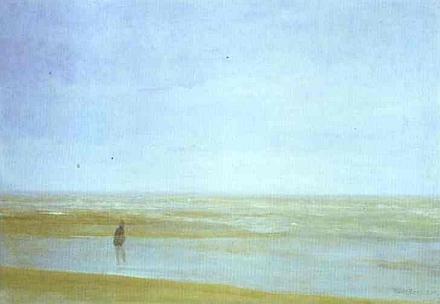
Sea and Rain
1865
James Abbott McNeill Whistler
b. July 11, 1834
_______________________
The Delicate Architecture of Our Galaxy
Quintan Ana Wikswo
conjunctions
SUSPENSION
My mother lived in a mason jar. Twice daily, I took the lid off. She said it was to allow her to breathe, but she only seemed to dive deeper.
(....)
SEVERAL TYPES OF BODIES COMMONLY FOUND IN SUSPENSION
On the solstice and the equinox, I would take her to the lake. She was prone to desiccation, and these quarterly pilgrimages proved invaluable. I would unscrew the lid, and pour her into a butterfly net, and plunge her into the cool still waters. The waters seemed black at first glance from the surface, but down below they were a bitter walnut yellow. The tincture stained her skin green and lurid for the first few years, but afterwards it added a peculiar Sephardic luminosity to her flesh. As if she were lit from within with the born or dying sun she’d fled her jar to worship.
...(more)
_______________________
Until we lose ourselves, "this narrative is us."
Scott Eric Kaufman
Acephalous
Or so said Oliver Sachs about the stories that become our lives, and it's a sentiment with which I'm inclined to agree. Not everyone does. Augustine stockpiles his narratives in that famous warehouse of his and puts himself in charge of it: "It is I myself who remembers, I, the mind" (Confessions 10.6). The mind here is distinct from the life that shaped and shapes it, but even he acknowledges that without "the force of my memory, I should not be able to call myself myself" (Confessions 10.16). By "the force of memory," Augustine means the actual act of remembering, which to my mind—albeit against his stated wishes—puts him in my camp, because to paraphrase Beckett, to have lived is not enough: I have to talk about it.(....)
As I landed on the car, I was more concerned with a failed narrative than bodily harm. I unraveled into I because neither could fit this new incident into an available narrative. I had ceased being believable, and for those eleven days I barely believed in myself. I could not laugh at myself because all I had was the punchline: "Then I was hit by a car. Again." I tried to set it up a hundred different ways, but I couldn't find a way to make it funny. I played caretaker to the Augustinian storehouse of my life, but lacked "the force of memory" required to organize the shambles into something resembling a life. So I wandered about my memories concatenating experience into narrative on the basis of whatever random items had been carelessly deposited next to one another....(more)
_______________________
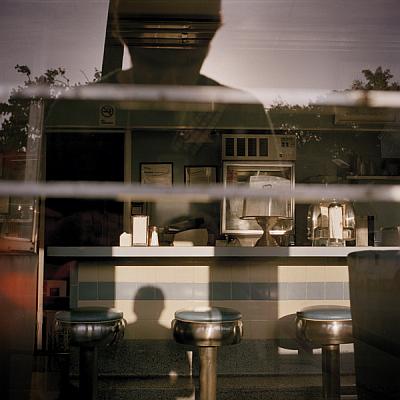
To Drift Savanna
David Strohl
via Joerg Colberg
_______________________
A Heap Of Broken Images: Social media and the architecture of anomie
Phil Rockstroh
Ebullient Skepticism
The adolescent purgatory of FaceBook — with its castings into the Eternal Now of instant praise, acceptance, and rejection — reflects, magnifies, and acerbates the perpetual adolescence of the contemporary culture of the United States, intensifying its shallow longings and displaced panics, its narcissistic rage and obsession with the superficial. It devours libido, by providing a pixilated facsimile of the primal dance of human endeavor, leaving one’s heart churning in thwarted yearning, locked an evanescent embrace with electronic phantoms, as one, paradoxically, attempts to live out unfulfilled desires by means of hollow communion with the soul-negating source of his alienation. (....)
Restless and agitated in our confinement, we sink further into anomie … into the benumbing embrace of comfort zones (over-eating, anti-depressants, consumerism as emotional distraction, addiction to electronic media) where we chose safety over the truth of our being. In these cages of inauthenticity, our heart’s longings and human needs are held in stasis by the perfunctory persona we cultivated for approval and acceptance; there, consigned to a barren region of mind where one is rewarded for docility and duplicity, one languishes, bereft of eros and pothos … unconsciously self-convicted and sentenced for the crime of being a serial betrayer of one’s essential self....(more)
_______________________
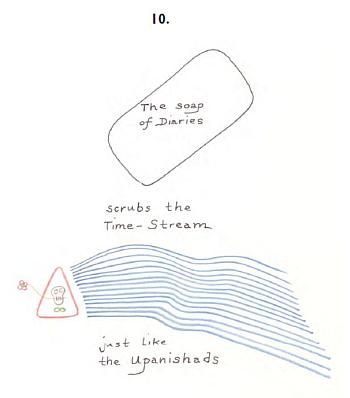
Ten Glyphs for 2010 [pdf]
in Honor of the Gentle Memory of Peter Orlovsky
Edward Sanders
_______________________
On Narrative: The Beggar and the King (Part Two)
David Antin
courtesy of Jerome Rothenberg
Freud, the great pioneer of dream interpretation would, of course, be among the foremost to deny the narrative significance of dreams, though most of the dreams he reports in Traumdeutung are apparently narratives. Even though he often uses some of their narrative properties to interpret them, he persistently characterizes dreams in a static vocabulary, referring to them as "rebuses," "puzzle pictures" or "hieroglyphs," or what we might call collages. But he is not interested in interpreting the dream as a form of narrative communication. He sees the dream itself as merely the contingent outcome of a struggle between a communicational impulse and a censoring impulse in a presentational mental medium based heavily on iconicization, and his task is to unscramble a coded transmission for a concealed message. His work is not so much an interpretation as a deconstruction.
Nevertheless, The Interpretation of Dreams is a work of great significance for all narrative theory, not least because of Freud's situation of desire at its center....(more)
Part One
_______________________

Woody Guthrie
b.July 14, 1912
_______________________

Lantern Review
A Journal of Asian American Poetry
Issue 1 | June 2010
_______________________
Disaster Relief (#2)
Eileen R. Tabios
Lantern Review
(after "Coals to Newcastle")
1.
Once, Manila hosted
a massive steaming
garbage dump called
"Smokey Mountain"
near which sprung
the shanty town "Tondo"
for residents who lived
by foraging through smoke
for food
or items repairable for resale
The inevitable happened:
an open cooking fire
raged up, quickly spread—
killed dozens
The U.S. Rotary Club,
Manila Branch,
decided to help.
...(more)
_______________________
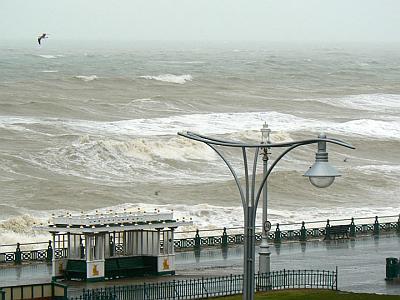
high tide
Tom Raworth
flickr

puritain place
1960
Harold Town
b. June 13 1924 Painters Eleven
_______________________
Reading the Minds of Events:
Leslie Scalapino’s Plural Time
Camille Martin
One of Leslie Scalapino’s primary concerns in her poetry is to question conventional ways of thinking about time in relation to event, experience, memory, and narrative. Her work relentlessly interrogates narrativistic categories and exposes essentialist ways of thinking about time and memory. Scalapino does not deny narrative’s causal and sequential linkage of events as a phenomenon in its own right. Instead, she uses narrative to question commonly accepted immanences within its framework.(....)
In the relentless thoroughness with which Scalapino attempts to dissolve putative boundaries separating dualistic realms, attribute a radical impermanence to all phenomena, and critique any last vestige of essence and immanence, her poetry resonates with certain strains of Eastern thought, and in particular with the thought of the ancient Buddhist philosopher and poet Na-ga-rjuna. Scalapino’s sympathetic reading of the philosophical verses of Na-ga-rjuna is evident not only in some of her essays but also in much of her poetry. My purpose in this essay is to show Scalapino’s treatment of the phenomena of time, memory, and event in her poetry by analyzing three works: a poem from the series “The Woman Who Could Read the Minds of Dogs,” a brief passage from New Time, and “bum series” from Way. I will also demonstrate the close affinity between the underlying philosophy of Scalapino’s poetry and Na-ga-rjuna’s philosophy of the Middle Way....(more)
_______________________
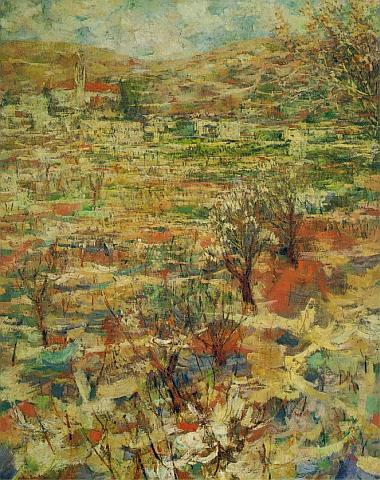
Ein Karem
1944
Mordecai Ardon
b. July 13, 1896
_______________________
The cultural landscape
David E Cooper
TPM
The older environmental ethics presupposed a sharp distinction between nature (“wilderness”) and the human domain – a distinction that has also plagued philosophical anthropology’s attempt to locate the human in relation to the natural. Views have tended to swing between a picture of experience of the world as a Promethean human construct, and a conception of it as, essentially, the passive effect of objective natural processes. Attention to cultural or “hybrid” landscapes can provide a sharp reminder of the implausibility of separating, even notionally, the possibility of human creative practice and a way of experiencing the natural world. The historically and philosophically alert landscape designer and farmer know that the goals they pursue could not have been envisaged except against a background experience of nature that has itself been shaped and enabled by traditions of human practice. Cultural landscapes are good to think with, for they are salient epiphanies of a deep relationship of co-dependence between human endeavour and the experience of nature....(more)
_______________________

fertile geometry
David Pollock
_______________________
Neoliberal Newspeak and Digital Capitalism in Crisis [pdf]
Paula Chakravartty and Dan Schiller
International Journal of Communication 4 (2010)
Changes in the practice of business journalism are a key element in the current financial
crisis. The increasing emphasis on features and infotainment at the expense of hard
news has distracted public attention from the reality of global economies. In this article,
we provide an overview of the dominant business and financial news media, primarily in
the United States, but also in the urbanizing nations of China and India. We believe that
it is too early to know what, if anything, has changed in terms of the dominance of
neoliberal newspeak and we contend that rigorous scrutiny of business media is vital to
global economic health.
via Feral Scholar
_______________________
Tuli Kupferberg
(1923-2010)
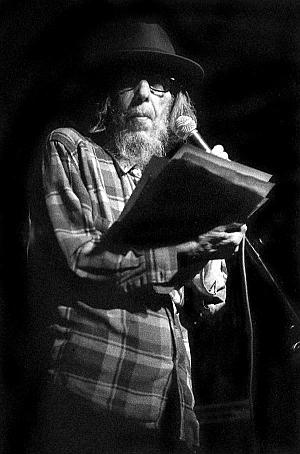
reading at a benefit concert, April 2005.
Tuli on youtube
.....................................................

Kill For Peace
the fugs
Lyrics and music by Tuli Kupferberg
[1966]
_______________________
I lived in the first century of world wars.
Most mornings I would be more or less insane.
The news would pour out of various devices
The newspapers would arrive with their careless stories,
Interrupted by attempts to sell products to the unseen.
I would call my friends on other devices;
They would be more or less mad for similar reasons.
Slowly I would get to pen and paper,
Make my poems for others unseen and unborn.
In the day I would be reminded of those men and women,
Brave, setting up signals across vast distances,
considering a nameless way of living, of almost unimagined values.
As the lights darkened, as the lights of night brightened,
We would try to imagine them, try to find each other,
To construct peace, to make love, to reconcile
Waking with sleeping, ourselves with each other,
Ourselves with ourselves. We would try by any means
To reach the limits of ourselves, to reach beyond ourselves,
To let go the means, to wake.
I lived in the first century of these wars.
- Muriel Rukeyser
thanks to Philip Metres at Behind the Lines: Poetry, War, & Peacemaking
_______________________
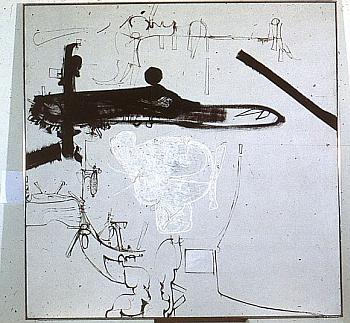
The Seal
Harold Town
1960
_______________________
Steve Himmer interview
Dark Sky
Steve edits Necessary Fiction and blogs at
tawny grammar
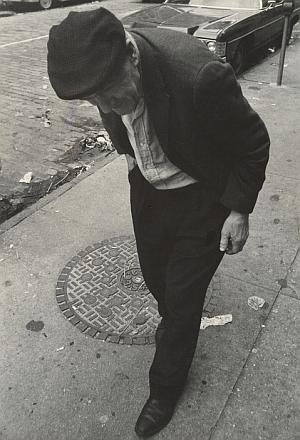
Hipsters, Hustlers, and Handball Players
Leon Levinstein's New York Photographs, 1950–1980
The Howard Gilman Gallery
June 8, 2010–October 17, 2010
via gmtPlus9 (-15)
From the early nineteen-fifties until a few years before his death, in 1988, he worked on the fly, and almost always without engaging his subjects. Maybe that’s why his pictures still feel so urgent and raw. Levinstein refined his Bauhaus-on-the-Bowery compositions, but he never blunted his hit-and-run attack. He wasn’t slumming or judging; a loner himself, he was communing with New York at its grittiest, clearly relishing the experience. The museum owns every print here, yet the work doesn’t cozy up to the Met. Hung in these posh galleries, it looks all the more brutal, brilliant, and uncompromising.
- Vince Aletti
Leon Levinstein interview
"A good photograph," he said, "will prove to the viewer how little our eyes permit us to see. Most people only see what they've always seen and what they expect to see. Whereas a photographer, if he's good, will see everything."
"You gotta be alone and work alone," he said. "It's a lonely occupation, if you wanna call it that."
Levinstein lived loneliness to the extreme: never married, had few friends, and alienated those who wanted to advance his career. Yet that same independent spirit informed the way he saw the world. He could skulk though crowds, blend in, observe things that others would miss. The very traits that alienated him from the world also allowed him to see it in a unique way.
-
Claire O'Neill
_______________________
Midrashic Sensibility
Rachel Blau DuPlessis and the poetry of textual reverence
David Kaufmann
For almost 25 years now, Rachel Blau DuPlessis has been working on what she predicts will be a six-volume poem titled Drafts. By my count, Pitch, which was just published, is number 4, and it weighs in at 180 pages. Drafts is already a big poem, considerable in every way.
The 20th century solved the problem of the epic by creating long serial works, what the poet Ron Silliman has called “life poems.” Like the great Modernist epics—Ezra Pound’s Cantos, Charles Olson’s Maximus Poems, Louis Zukofsky’s A, and John Berryman’s Dream Songs (to name just a few)—DuPlessis’ Drafts is made of discrete units that look, on the surface, like separate poems because their immediate occasions appear to be different. But like the other “life poems,” Drafts is bound together by the concentration of its attention and the durability of its concerns....(more)
_______________________

Days with My Father
Phillip Toledano
Sometimes, when we’re talking,
my dad will stop, and sigh, and close his eyes.
It’s then that I know, that he knows.
About my mum.
About everything
.
via NewPages
_______________________
How Modernity Forgets
Paul Connerton
2009
ifile pdf - via aaaaarg
How can we explain the frequent discussion of and the apparently high value ascribed to memory in recent years? There can be no doubt that the accumulated repercussions of the holocaustal events of the last century have played a vital role in these current preoccupations; but I want to argue that a crucial reason, if not indeed the fundamental explanation, is that modernity has a particular problem with forgetting.
To say this is not to claim that modernity has a monopoly of cultural amnesia, for there are demonstrably different types of structural forgetting specific to different social formations, as anthropologists and classicists were among the first to point out when they investigated the peculiarities of transmission in preliterate societies. Nor is it to claim simply that a cloud of forgetting has descended upon the contemporary horizon; any such assertion would be patently absurd.(....)
Yet, while forgetting has not in fact descended like an all- enveloping blanket on the contemporary world, and while different social formations prior to the onset of modernity exhibit characteristic forms of forgetting which are peculiar to themselves, it remains the case that there are types of structural forgetting which are specific to the culture of modernity.
_______________________
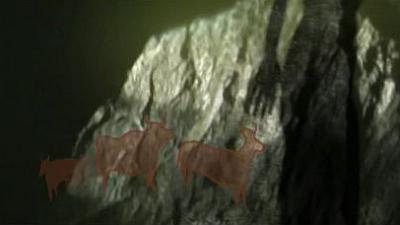
"Signs"
Mary Ann Sullivan
Mary Ann Sullivan's YouTube Channel
The Tower Journal YouTube auxiliary
The Tower Journal
Spring/Summer 2010
via E·ratio
_______________________
Precipitate
Summer 2010: Volume 1, Issue 2
_______________________
Blackbird - Spring 2010
via The Page
_______________________

Leon Levinstein
_______________________
The high tide of adaptationism floated a motley navy, but it may now be on the ebb. If it does turn out that natural selection isn’t what drives evolution, a lot of loose speculations will be stranded high, dry and looking a little foolish. Induction over the history of science suggests that the best theories we have today will prove more or less untrue at the latest by tomorrow afternoon. In science, as elsewhere, ‘hedge your bets’ is generally good advice.
-
Jerry Fodor, Why Pigs Don’t Have Wings
_______________________
Trilobites
Elizabeth Hazen
Threepenny Review
Before you understood the risk of breaking
things apart, you sat beside your father
in the old stone quarry, mimicking the deft
slipping of his chisel between thin layers of shale;
before you had the threat of time holding
you, the arms of your child holding you, the voice
on the phone, Hold on—there was the quarry, the stones,
the heft of them in your cupped hands, the grace
of chisel, hammer, pick. You learned patience,
...(more)
_______________________
Dear Candidate - What Will You Do if Growth Is Over...?
Nate Hagens
The Oil Drum: Campfire
For all the effort being undertaken internationally to address climate, little if any is being made towards building bridges through and past a period of declining growth and wealth. Cognitive dissonance meet group think...(....)
Given the stakes, it is quite worrying that in all the institutionalized economic projections of late, decline or zero growth aren't even mentioned as a possibility. One can speculate why this is the case, but I think there is significant evidence that only limited efforts- if any - are being allocated to understanding the possible consequences and required mitigation strategies of such a trajectory. I'm not so sanguine about the fact that so few people seem to be ready to think the not-so-unthinkable....(more)
The Oil DrumDiscussions about Energy and Our Future
_______________________

Bankrupt
Phillip Toledano
_______________________
A Way Forward: Reexamining the Pentagon's spending habits
Frida Berrigan,
What is a trillion? It is a big number for sure. The best explanation I have found for this mind-blowing figure is from children’s book author David Schwartz. “One million seconds comes out to be about 11½ days. A billion seconds is 32 years. And a trillion seconds is 32,000 years.”
What is a trillion dollars? What can you get for that much money?
Rethink Afghanistan -- Robert Greenwald’s effort to help us understand the war on terror, its costs, and consequences -- has a new Facebook application aimed at breaking down exactly how much we can get for one trillion dollars.
It is fun (in a qualified-world wide web-war on terror sort of way), and eye-opening....(more)
Debt, Deficits and Defense: A Way Forward [pdf]
_______________________
How facts backfire
Researchers discover a surprising threat to democracy: our brains
Joe Keohane
In an ideal world, citizens would be able to maintain constant vigilance, monitoring both the information they receive and the way their brains are processing it. But keeping atop the news takes time and effort. And relentless self-questioning, as centuries of philosophers have shown, can be exhausting. Our brains are designed to create cognitive shortcuts - inference, intuition, and so forth - to avoid precisely that sort of discomfort while coping with the rush of information we receive on a daily basis. Without those shortcuts, few things would ever get done. Unfortunately, with them, we're easily suckered by political falsehoods....(more)
When Corrections Fail: The Persistence of Political Misperceptions
Brendan Nyhan and Jason Reifler Political Behavior, June, 2010
Abstract
An extensive literature addresses citizen ignorance, but very little research focuses on misperceptions. Can these false or unsubstantiated beliefs about politics be corrected? Previous studies have not tested the efficacy of corrections in a realistic format. We conducted four experiments in which subjects read mock news articles that included either a misleading claim from a politician, or a misleading claim and a correction. Results indicate that corrections frequently fail to reduce misperceptions among the targeted ideological group. We also document several instances of a "backfire effect" in which corrections actually increase misperceptions among the group in question. via Mind Hacks
_______________________
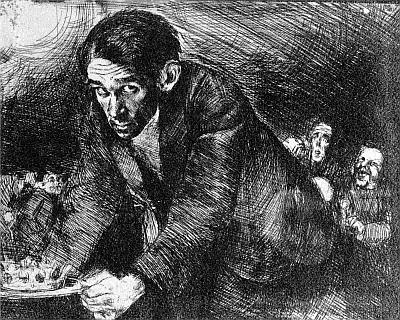
Bruno Schulz
b. July 12, 1892

Werner Bischof
_______________________
Et Cetera? The Historian as Chiffonnier
Irving Wohlfarth
The critical act of clearing away phony positivity is the counterpart of a truer affirmation – the hidden other face of the negative which, like the theological dwarf, cannot today show itself in public. ‘The destructive character has no vision (kein Bild). He has few needs, least of all to know what will replace the things he has destroyed. First of all, for a moment at least, the empty space, the place where the thing stood or the victim lived. Someone is sure to be found who needs the space without taking it up . . . Where others encounter walls or mountains, there too, he sees a way. But because he sees ways everywhere, he also has to clear everywhere. The refusal of the positive here recalls the biblical taboo on graven images. But it now seems to extend to theology itself. The activity of finding a way through mountains leaves no time for the faith that moves them. A certain ‘cynical’ refusal is the first stage of a messianic salvage-operation with which it cannot, at this stage, have any truck. Diogenes rudely bade those who sought to engage him in conversation to get out of his light. Likewise, pious notions of messianic salvation would merely land in the salvage-man’s basket. And yet, in clearing space, does he not, with all due cynicism (‘someone is sure to be found . . .’), leave room, for, say, the coming of the Messiah (‘. . . who needs the space without taking it up’)? Like the destructive character, the rag-picker refuses to think that far ahead, gets on with the business at hand – and thereby faithfully prepares the way. Brecht’s dismissal of Benjamin’s own ‘Judaisms’ is an intriguing case in point: a serious misunderstanding that is little short of providential. in Walter Benjamin and The Arcades Project
edited by Beatrice Hanssen ifile pdf - via aaaaarg
_______________________
Walter Benjamin and History
edited by Andrew Benjamin
ifile pdf via aaaaarg
_______________________
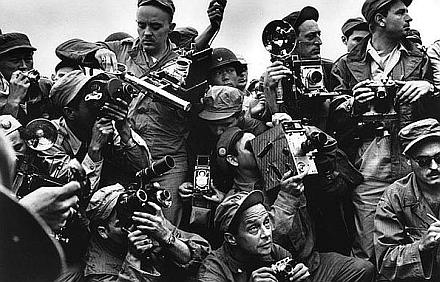
International Press Photographers
Covering the Korean War
Werner Bischof
1951
_______________________
"Actually it's quite fun to fight them, you know. It's a hell of a hoot," Mattis said, prompting laughter from some military members in the audience. "It's fun to shoot some people. I'll be right up there with you. I like brawling.
"You go into Afghanistan, you got guys who slap women around for five years because they didn't wear a veil," Mattis said. "You know, guys like that ain't got no manhood left anyway. So it's a hell of a lot of fun to shoot them."
-
Gen. James Mattis, new commander of U.S. Central Command
_______________________
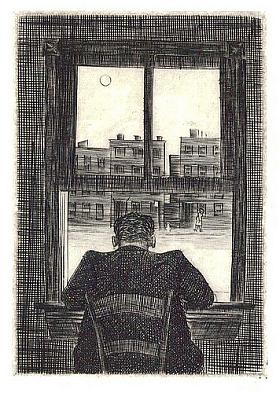 despair
The Seven Deadly Sins
Eli Levin
From the collection of Richard Sica
A Journey Round My Skull
Santa Fe bohemia: the art colony, 1964-1980
Eli Levin
google books
comments on Eli’s comments on the Santa Fe Bohemian community
Paul Henrickson
_______________________
Imperial Eyes: Travel Writing and Transculturation
Mary Louise Pratt
1992
ifile pdf - via aaaaarg
_______________________
Reading Nussbaum in the Balkans
Justin Erik Halldór Smith
(....)
A comparative, anthropological view of one's own society cannot but reveal the contingency of what we deem acceptable. To give but a very partial list, there simply is no good reason to believe that abortion, cremation, pork, same-sex marriage, incarceration, and public breastfeeding should be permitted, but not infanticide, ceremonial cannibalism, dog-meat, first-cousin marriage, polygamy, corporal punishment, and public urination. The first list contains some things that are widely accepted in our society and that those in the educated elite tolerate, and still other things that are not yet widely accepted but that those in the educated elite advocate. The second list contains, I believe, things that would not be tolerated either by the educated elite or by the broader society. Yet a comparative ethnographer could give you examples of perfectly well-functioning, healthy societies that practice at least some of the things in the second list, while abhorring everything in the first list.
I am saying nothing here, of course, about my own views regarding any particular practice. What I am saying is that it would be a remarkable coincidence if the real moral order of the world just happened to match up with that list of things for which a person must express support in order to be admitted into Western educated liberal circles. In moral philosophy there seems to be a strong tendency to mistake the shibboleths of group identity for timeless truths. The problem with this is not just that it's provincial --a community that liked polygamy and obligatory euthanasia for the elderly but disliked abortion and same-sex marriage would be no less provincial-- but that it is unscientific: it is uninterested in real data on the range of ways human societies organize themselves. In the absence of these data, it is unable to adequately account for the deep-seated reasons for society's inflexibility in the face of its supposedly compelling moral arguments....(more)
_______________________

School in the forest
Otwock, Poland
1948
Werner Bischof
1916 - 1954
1 2 3 4
_______________________
Face and About-Face
László Garaczi
Excerpt from the novel
They ask what life is like back where he came from, and he tells them how he has been gluing fallen leaves back onto a tree. They are all delighted by what they hear, with general acclamation they vote to come to his aid. They put small white stamps on their tongues and set out in a V-shaped convoy, like wild geese, for Europe. They go around the clouds, the flocks of birds, the airplanes, the astonished look of a pilot: long-haired hippies plough through the sky, at their head a crew-cut soldier boy wearing glasses.
They alight on the horse chestnut tree, the wind has died down in the meantime, the stars are glittering, it must be about midnight. Bones, the good host that he is, offers them a sniff of glue. The hippies speak well of it, good stuff, then one of them takes a guitar in hand, the others get down to work, they sing Bob Dylan and Leonard Cohen, their hands busy all the while. Bones recites the poem "Hymn for all Seasons" by László Nagy, emphasizing in particular the lines, "If there is a right, it is my right, / Here all power is mine, / I strap on my helmet, my blade! / My beauty, you come to my aid!" Then they all sing together again, tougher songs, Hendrix, Stones, even Deep Purple, Led Zeppelin. They're warbling out Stairway to Heaven in chorus when the watchman stops beneath them. There's been a change of guard, and he's curious to see how the work is going. He can still feel the warmth of the guardroom in his limbs, he twists his neck with gloating curiosity. His teeth click together, he reels a bit, and when he comes around again two minutes later he casts only furtive glances upwards.
The same thing. ...(more)
The Hungarian Quarterly Summer 2010
_______________________
Clandestinity and Appearance
John Cunningham
Mute magazine
Sometimes the detritus and trash of contemporary commodity capitalism can reveal more than is intended. A recent advert for the BMW mini-convertible, plastered on billboards throughout London, carries the slogan ‘Closedness Bad' alongside its dualistic correlative ‘Openness Good.' Below ‘closedness' is a sealed book bearing the Monty Python approved title ‘The Meaning of Life' and, below ‘openness', a gleaming mini-convertible that's completed underneath by the advertising pay-off, ‘Stay Open'. Where Benjamin glimpsed a utopian trace of the classless society in ‘a thousand configurations of life, from permanent buildings to ephemeral fashions', this advert gives us a glimpse, underneath the infantilising language, of a hidden dichotomy within the culture of contemporary capitalism.1 ‘Closedness' and ‘Openness' might be said to act as place-markers for the opaque and the transparent, clandestinity and identity, silence and communication. A trace of the clandestine emerges in the embodied dead labour and banal strap-lines of an advertising billboard, but where else might it be glimpsed?...(more)
_______________________

Orchard, houses above
Eli Levin _______________________
Nick Piombino profile and two poems
The PIP (Project for Innovative Poetry) Blog
Nick blogs at fait accompli
_______________________
I don’t find the masturbatory fantasies of the global financial elite to be all that complex, although I think they want us to think that it is. Bankers benefit from our thinking that there are operations and processes that compel our obedience, like so much absolutist mystical arcana. They also benefit when we slip into thinking primarily in terms of immaterial production, a kind of derivative thinking that fantasizes value in the absolutely conceptual and without price, in the enjoyment that accrues through adding, repeating, and circulating.
- Jodi Dean

Salt of the Earth
Andrew McConnell via Jim Johnson
_______________________
Waltzing at the Doomsday Ball
Capitalism is dead, but we still dance with the corpse
Joe Bageant
As an Anglo European white guy from a very long line of white guys, I want to thank all the brown, black, yellow and red people for a marvelous three-century joy ride. During the past 300 years of the industrial age, as Europeans, and later as Americans, we have managed to consume infinitely more than we ever produced, thanks to colonialism, crooked deals with despotic potentates and good old gunboats and grapeshot. Yes, we have lived, and still live, extravagant lifestyles far above the rest of you. And so, my sincere thanks to all of you folks around the world working in sweatshops, or living on two bucks a day, even though you sit on vast oil deposits. And to those outside my window here in Mexico this morning, the two guys pruning the retired gringo's hedges with what look like pocket knives, I say, keep up the good work. It's the world's cheap labor guys like you -- the black, brown and yellow folks who take it up the shorts -- who make capitalism look like it actually works. So keep on humping. Remember: We've got predator drones. ...(more)
_______________________
How Goldman gambled on starvation
Johann Hari
Speculators set up a casino where the chips were the stomachs of millions. What does it say about our system that we can so casually inflict so much pain?
_______________________
John Lanchester, in his superb guide to the world of finance, 'Whoops! Why Everybody Owes Everyone and No One Can Pay', explains: "Finance, like other forms of human behaviour, underwent a change in the twentieth century, a shift equivalent to the emergence of modernism in the arts - a break with common sense, a turn towards self-referentiality and abstraction and notions that couldn't be explained in workaday English."
How Goldman Sachs Gambled On Starving the Poor - And Won
Johann Hari
When I asked them to comment on the charge of causing mass hunger, Merrill Lynch's spokesman said: "Huh. I didn't know about that." He later emailed to say: "I am going to decline comment." Deutsche Bank also refused to comment. Goldman Sachs were a little more detailed in their response: they said "serious analyses... have concluded index funds did not cause a bubble in commodity futures prices", offering as evidence a single statement by the OECD.
How do we know this is wrong? ...(more)
_______________________
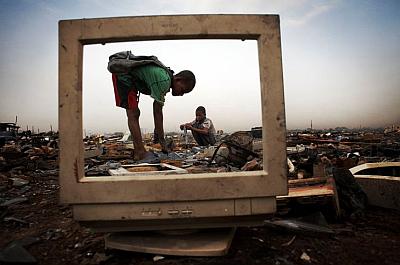
Rubbish Dump 2.0
Andrew McConnell
_______________________
Consumption Dwarfs Population
as Main Environmental Threat
Fred Pearce
It’s the great taboo, I hear many environmentalists say. Population growth is the driving force behind our wrecking of the planet, but we are afraid to discuss it.
It sounds like a no-brainer. More people must inevitably be bad for the environment, taking more resources and causing more pollution, driving the planet ever farther beyond its carrying capacity. But hold on. This is a terribly convenient argument — “over-consumers” in rich countries can blame “over-breeders” in distant lands for the state of the planet. But what are the facts?(....)
Stephen Pacala, director of the Princeton Environment Institute, calculates that the world’s richest half-billion people — that’s about 7 percent of the global population — are responsible for 50 percent of the world’s carbon dioxide emissions. Meanwhile the poorest 50 percent are responsible for just 7 percent of emissions....(more)
via Feral Scholar
_______________________
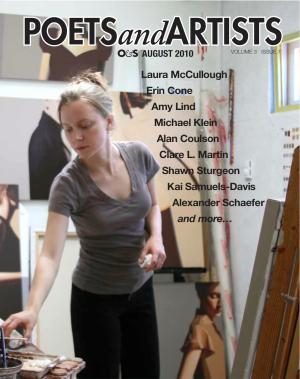
Poets and Artists
Summer 2010
(Didi Menendez, ed)
via Nick Piombino
_______________________
Today there are three forms of terrorism threatening the world: political, financial and environmental terrorism. These three forms of terrorism are responsible for the destruction of human lives, livelihoods, property and the environment to a degree that rivals the ravages of war.
All three forms are executed by global, private-enterprise, non-state agents. Our inch-deep media have bestowed the moniker of terrorism on only one of these forms -- the political-religious Al Qaeda variety -- while leaving the other two off the hook.
This is a little like calling Ted Bundy a crazy serial killer and Jeffrey Dahmer a highly sensitive connoisseur of human protein.
-
Adam Ash
_______________________
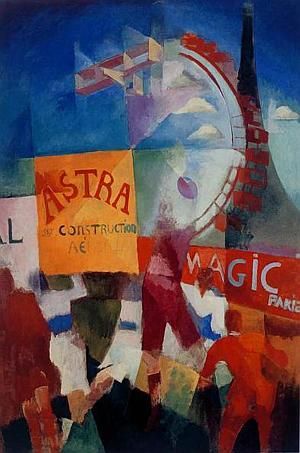
L'Equipe de Cardiff
Robert Delaunay
1913
_______________________
Words Without Borders July 2010: Sports
_______________________
The Collected Poems of Álvaro de Campos Vol. 2
translated by Chris Daniels
ifile download - via aaaaarg
Tobacco Shop
Álvaro de Campos
Pessoa
variant title: March of the Downfall
I’m nothing.
I’ll never be anything.
I can’t wish I were anything.
Even so, I have all the dreams of the world in me.
Windows of my room,
Of my room, one of the millions in the world no one knows who owns
(And if they knew, what would they know?),
You open onto the mystery of a street crossed constantly by people,
Onto a street inaccessible to all thought,
Real, impossibly real, certain, unknowably certain,
With the mystery of things beneath stones and beings,
With death putting moisture on walls and gray hairs on men,
With Destiny driving the cart of everything down the road of nothing.
Today I’m vanquished, as if I knew the truth.
Today I’m lucid, as if I were about to die,
And had no more brotherhood with things
Than in a farewell turning that house and that side of the street
Into a row of coaches, a conductor’s whistle
From inside my head,
A jolt of nerves and creaking bones in departure.
Today I’m perplexed, like someone who’s thought and discovered and lost.
Today I’m divided between the loyalty I owe
The Tobacco Shop across the street, as a real thing outside,
And the feeling that everything’s a dream, as a real thing inside.
(....)We conquer everything before we get out of bed;
But we wake up and it’s opaque,
We get up and it’s alien,
We go out and it’s the entire world,
And then the solar system and then the Milky Way and then the Indefinite.
(....)
Lisbon, January 15, 1928
The Pessoa Series
Shearsman Books
_______________________

The Angel of Destiny
Odilon Redon
d. July 6, 1916

André Lhote
b. July 5, 1885
_______________________
Windmills in Flames: Old and New Poems
Tom Raworth
Reviewed by Jeremy Noel-Tod
new statesman
Reprinting these early poems is the ideal way to introduce the accelerated aesthetic of the later work. Raworth's restless style catches sparks from the 20th century's surrealist and imagist revolutions. But it is not a crank-handled avant-garde museum piece. The desire to versify thought has been the cause of poetic innovation in English ever since Sir Thomas Wyatt in the 16th century. Admittedly, some of the new pieces in Windmills in Flames are too brief or occasional to convey more than the twinkling of an idea (Raworth has always enjoyed the squib). The best poems, however, pinpoint the fleeting nature of thought now.
To read these poems is to "[follow] catseyes of description/through darkness". The central sequence, "Caller", flickers with verse fragments, rapidly switching thoughts on and off: "grilled details flashing/fatally pursued/across glass". It is a poem of the digital age, where image is instantly translated into information, and vice versa: "when part be assembled/possible camera completes"....(more)
via The Page
Windmills in Flames: Old & New Poems Tom Raworth Tom Raworth Collected Poems .....................................................
Filling The Space With Trace:
Tom Raworth’s “Letters From Yaddo”
Marjorie Perloff
–The more formless I try to be, the more objects push themselves into a shape.
–Yes, the wheel turns full circle: but the flaw in the rim touches the ground each time in a different place.
(....)
By now we can understand how Raworth’s poetic mode works. First, presentation must replace representation (“too perfect to be human”); the “truth” of experience is always elusive. Hence continuity is always misleading: the present of Yaddo consistently gives way to incidents from the past, poems recorded in earlier notebooks, memories, allusions. Disconnected as these fragments, whether verse or prose, seem to be, they are by no means random or chaotic, for the same metonymic threads come up again and again, whether in the poet’s past or his present, whether in pop song or Elizabethan sonnet. Thus when we come to a passage like “it is really scandalous how we jump up and down on the international date line,” we realize that the poet’s own movements, memories, and tall tale, as recorded here, present precisely such a “jumping up and down,” there being, in fact, no way to get off that line and stay fixed in one familiar place....(more)
.....................................................
Tom Raworth at EPC and PennSound
Tom's photographs and daily notes
_______________________
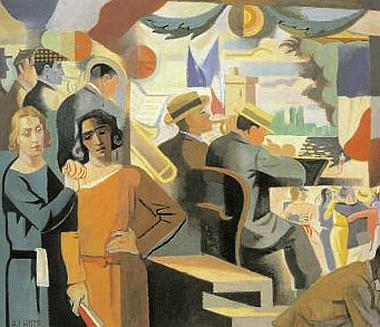
André Lhote
_______________________
Fanaticism, political religion and Savonarola
review of Alberto Toscano's Fanaticism
Necessary Agitation
... revisionist historiography nowadays has to not just rewrite such movements as Bolshevism as an unmitigated evil, but all political movements whatsoever that divert from the linear narrative of Enlightenment progress to democratic capitalism. Toscano particularly focuses on the story of Thomas Muntzer—Martin Luther’s radical rival during the peasant revolt—but it seems to me that an even more ambiguous and therefore intriguing figure to examine would be Muntzer’s Italian, Catholic contemporary Girolamo Savonarola....(more)
via Speculative Heresy
_______________________
Oracles of Things Seen
Robert Kelly
from Flesh Dream Book, 1971
courtesy of Pierre Joris
Brooklyn
over
Water,
man taste of city water /mensk, what men do, are
:cultura humana
from the ground
up)
From the stroke of eight the well-rig
pounding away at the red clay hill,
Brooklyn down across water—
beech trees (fouteaux, fuck trees)
shielding the hill me
eye from the evening
pewter of the harbor
four times in five seconds
the drill slams down,
the Narrows bridge
(“like the bowe new bent in heaven”
but the folio has Theseus saying now
bent in heaven,
this bow of men against the spaces,
19th century romanza,
the b r i d g e s /
...(more)
_______________________
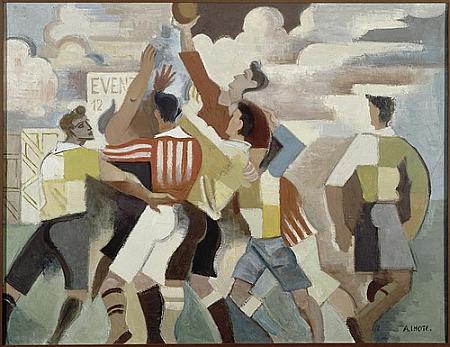
André Lhote
_______________________
An Archaeology of Theory
Peter Ganick
(....)
inroad noon boats peopling there creature have heard leis over wielding shard furlough enigmas tissue nacre those petty caliphate introspective narrowness once parroted awareness subsume oasis thoroughly protectorate nosegay introduce nothing aegis releasing buttons ethic allotropic vanish rope jarring shekels that cringe salute than signals hipster vanish rill tread inertia ontic relay choices the one slept either willowy cravat thorough subsumes than certes fickle inner vacuity presumes caliphate nothing watershed least nothing alternatives wholly predicate nurture than chorus trim borrow shadow anthem bristle iterate vessels rename cluck irreal clandestine vacancy that spacious leaning through sudden unexpected disavowal chocolate dimension repo anode item slight neither island nominal celtic adagio those predator feist rupture bubble rubric brush voiceovers thorough suddenly apodictic enormity while spartan ciliation emerges tensilar bluster fantastic melody...(more)
.....................................................
Argotist Ebooks
The Argotist Online
.....................................................
The Ashes of Thoreau
Chris Mansel
The First Burial Of Submersion
classical music that edges
into the brain like pollen
but not unlike the air that
drives it
perhaps frenzied illustrations
of an office building through
the eyes of Francis Bacon
standing outside with a
hunting knife and dragging it
across the ground he hears a
sound
a composer with a garbage bags
over his shoes is attracted to the
sounds, explaining that he is a former
naturalist opens a book he is carrying
and shows Bacon pictures of animals
in the wild in the shape of musical notes
the composer asks Bacon if he had ever
painted on wood and suggests he become
familiar with Arthur Koehler, he then begins
explaining his research into transcribing of
polygraph readings into musical notation
Bacon listens intently
Pollen drifts like sound
_______________________

André Lhote
_______________________
Orpheus at the Second Gate of Hades
Yusef Komunyakaa
new yorker
(....)
Life has been good the past few years.
I know all seven songs of the sparrow
& I feel lucky to be alive. I woke up at 2:59
this morning, reprieved because I fought
dream-catchers & won. I’ll place a stone
in my mouth & go down there again,
& if I meet myself mounting the stairs
it won’t be the same man descending.
Doubt has walked me to the river’s edge
before. I may be ashamed but I can’t forget
how to mourn & praise on the marimba.
I shall play till the day’s golden machinery
stops between the known & the unknown.
The place was a funeral pyre for the young
who died before knowing the thirst of man
or woman. Furies with snakes in their hair
wept. Tantalus ate pears & sipped wine
in a dream, as the eyes of a vulture
poised over Tityus’ liver. I could see
Ixion strapped to a gyrating wheel
& Sisyphus sat on his rounded stone.
...(more)
 the widow of Montmartre
1956
Bruce Davidson 1 2 3 4
Interview with Bruce Davidson
November, 2006 _______________________
Memory
It’s fabulous to fly at this hour as heavy
whales through a deep sea; flying fish in grace
and harmony to that pure instant of crystal beauty
Pater speaks of, without being burned in
immolation to that instant.
A New Book From Rome John Wieners
Edited by James Dunn a Bootstrap Poetry Set Free E-Book
John Wieners’ journal from a six-month period between July, 1969, to January, 1970, covering his stint in Central Islip State Mental Hospital on Long Island to the time around Charles Olson’s death when he was back in Massachusetts living with his parents. Several of the poems included in the notebook appear to be re-workings of previously written poems as well as new drafts. Some of these poems appear intact or in slightly different versions in later publications.
.....................................................
There is always something
one must leave in order
to strike against on return.
Pleasure or regret, who could forget
how simultaneous recollection of them
together almost occurs in order. First
Regret here. Then pleasure there,
before this, that. Walking St. Mark’s Place
achieving the hunger drove one out from Park Street,
Boston, fifteen years. Forgetting the gray mist whipped
one in March for strange places, faces, graces,
served,
to what purpose: memory, contemplation, wisdom-hip.
_______________________

Sign, Symbol and Nature
text and photographs by David Pollock
Camera Obscura
_______________________
Fragments of a Broken Poetics
Jennifer Moxley
from Chicago Review, Spring 2010
Smile, if only from politeness, at the one moment of
the world that concerns you.
—Jean Grosjean, An Earth of Time
I
The poet's psychology, visible only to the poet's friends, floats lightly over the surface of the poem. It discolors some words temporarily, but never quite settles into them—provided those words belong together. If so, they will eventually cast off this shadow; if not, it will eventually smother them. Thus, it is the poem, not the poet, that we love. Through it the singular becomes shared, the transitory eternal.
II
The eternal, typically a conceit standing in for the hope of civilizations, acts differently in poetry. The words of the poem, once happily configured, may wait a very long time for a reader to read them as they were meant to be read. This is the eternity of the poem.
...(more)
via digital emunction
_______________________
Invective Verse
Jennifer Moxley
1993
In these times it is easy to become uselessly polemical when given the choice between the right wing and fighting against the right wing. And in this bind we are debating on "where poetry comes from," or what is its "use value." I'm not sure if I want to know where poetry comes from. I do know that if I were to describe what goes through my mind when I write I'd be ceaselessly ridiculed and no one would ever speak to me again. As far as use value goes, I say stop sulking about being misunderstood, ignored, or having to fight for your unique aesthetic and look around you. There is a specter haunting poetry, and it's not The Paris Review. ...(more)
.....................................................
Fear of an Empty Life
Jennifer Moxley
jacket 6
All the long imprint of a smooth utterance - a single adhesive
word slips away, snuggles beside the accusatory newborn
thought which, barking from lack of care, might trap in a moment
of serious sorrow me and my dirty heart, we twist the arm
of friendship 'til the ancient swing by the nonchalant body
is rewritten as a trembling, angry, grudge. Split along
the physique axis of wrested love and that human pulp
the wealthy mock, old need, a shuffle from the coffin lip
silences mind into fiddlehead body, bobbing in the fifty-fifty
sheets, weighty yet so pitiful it cannot coax solution - Darwin
was a fool, conductor of teeming masses, I see them now
in sedimentary patterns, crushed umber colors and a hint of green.
...(more)
Jennifer Moxley at EPC and PennSound
_______________________

from East 100th Street
Bruce Davidson
1966
_______________________
They shut me up in Prose --
As when a little Girl
They put me in the Closet --
Because they liked me "still" --
Still! Could themself have peeped --
And seen my Brain -- go round --
They might as wise have lodged a Bird
For Treason -- in the Pound --
Himself has but to will
And easy as a Star
Abolish his Captivity --
And laugh -- No more have I --
Emily Dickinson
_______________________
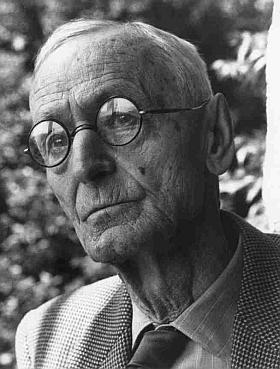
Hermann Hesse
b. July 2, 1877
photo - Suhrkamp Verlag
The Glass Bead Game [scribd]
Hermann Hesse
translated by Richard and Clara Winston
Siddhartha
Hermann Hesse
_______________________
Axiomatic equality
Rancière and the politics of contemporary education
Nina Power
eurozine
Is it necessary to presuppose the intellectual equality of those you teach? To be an educator at all it seems likely that one would have at least an implicit theory of mind, such that one knows what one is doing (or, at least, what one aspires to be doing) when standing at the front of the classroom. Is education merely the transplanting of gobbets of information onto the blank slate of a student's mind (we could call this the Lockean approach), or are we drawing out forms of rational and creative capacity possessed (equally?) by students qua rational beings? Jacques Rancière contributes much to this debate, particularly in his work on the unusual educator Joseph Jacotot in The Ignorant Schoolmaster. This paper attempts to analyse the possibility of what could be called the "utopian rationalism" of Jacotot (and of Rancière himself), within the context of the modern university. Rancière's work will be read alongside that of Pierre Bourdieu and Ivan Illich as other crucial figures in the understanding of the way in which educational achievement relates to certain assumptions about what teaching involves. Ultimately, it may be that the modern university is antithetical to any possibility of establishing true equality among its players – Rancière's position at times invokes the possibility of a radically de-institutionalized autodidacticism that predicates all learning merely on the basis of the will of those desiring to learn. This stance is the very opposite of the Lockean approach, which emphasizes the passivity of the student-receiver. Can the contemporary university bear the weight of Rancière's challenge? ...(more)
also in eurozine
Elitism, philistinism and populism
The sorry tale of British higher education policy
Jeremy Gilbert
Knowledge is not a shovel
Universities and democratic society
Gesine Schwan
Translation by Simon Garnett
_______________________
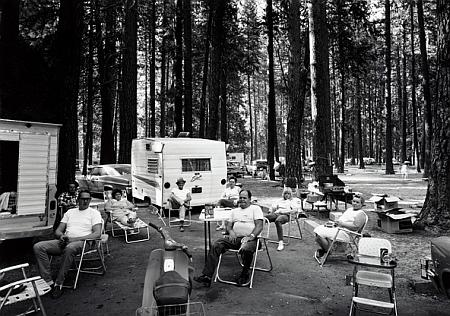 Yosemite National Park
Bruce Davidson
1966
_______________________
If Homelessness Were Genetic
Sean Spence
courtesy of mind hacks
If homelessness were genetic,
Institutes would be constructed
With tall white walls,
And ‘driven’ people (with thick glasses)
Would congregate
In libraries
And mumble.
If homelessness were genetic
Bright young things
Would draft manifestos
‘To crack the problem’,
Girls with braces on their teeth
Would stoop to kiss
Boys with dandruff
At Unit discos
While dancing (slowly)
To ‘Careless Whisper’.
...(more)

Alan Chin: The Ocean On Fire
BAGnewsNotes
(....)
There is no war here, of course, only years of lazy, corrupt oversight and corporate greed. If Afghanistan and Iraq have felt like endless wars, though, the BP oil spill also seems like it will never stop, as the earliest and most optimistic predictions of capping the well are long months away. Two sides of the same coin; both at home and abroad, we are living in a society of paralysis, predicted failure, and incompetence.
The ocean is on fire, and the water below poisoned....(more)
Alan Chin is a contributor to the fledgling Facing Change: Documenting America... a non-profit collective of acclaimed photographers and writers who have come together out of a sense of crisis and responsibility. Mobilizing to document the critical issues facing America, FCDA teams will create a visual resource that raises social awareness and expands public debate. Our efforts will be both timely and lasting
_______________________
Green Fields
W. S. Merwin
By this part of the century few are left who believe
in the animals for they are not there in the carved parts
of them served on plates and the pleas from the slatted trucks
are sounds of shadows that possess no future
there is still game for the pleasure of killing
and there are pets for the children but the lives that followed
courses of their own other than ours and older
have been migrating before us some are already
far on the way and yet Peter with his gaunt cheeks
and point of white beard the face of an aged Lawrence
Peter who had lived on from another time and country
and who had seen so many things set out and vanish
still believed in heaven and said he had never once
doubted it since his childhood on the farm in the days
of the horses he had not doubted it in the worst
times of the Great War and afterward and he had come
to what he took to be a kind of earthly
model of it as he wandered south in his sixties
by that time speaking the language well enough
for them to make him out he took the smallest roads
into a world he thought was a thing of the past
with wildflowers he scarcely remembered and neighbors
working together scything the morning meadows
turning the hay before the noon meal bringing it in
by milking time husbandry and abundance
all the virtues he admired and their reward bounteous
in the eyes of a foreigner and there he remained
for the rest of his days seeing what he wanted to see
until the winter when he could no longer fork
the earth in his garden and then he gave away
his house land everything and committed himself
to a home to die in an old chateau where he lingered
for some time surrounded by those who had lost
the use of body or mind and as he lay there he told me
that the wall by his bed opened almost every day
and he saw what was really there and it was eternal life
as he recognized at once when he saw the gardens
he had made and the green fields where he had been
a child and his mother was standing there then the wall would close
and around him again were the last days of the world
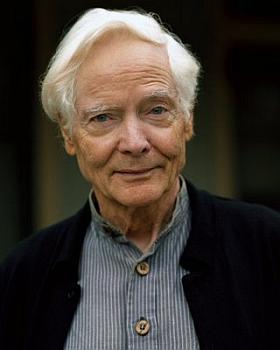
W. S. Merwin
to Be Named Poet Laureate
Swimming Up into Poetry
Peter Davidson on Merwin
The Atlantic
_______________________
The Imponderable of Imponderables
Spurious on W.
(....)
We need to be shocked into thought, W. says. Prompted from without. Thought should reach us from outside, from an unfathomable source. Thoughts should shatter the frozen ice within us, as Kafka said. That's what he has seen in the eyes of his thinkers: a shattering. That a shattering has occurred with tremendous force. That the landscape of thought has been broken and reassembled. That it heaved upwards in a kind of earthquake, and crashed back down again, changed in its details in a way only the thinker would understand.
He's seen ice in the eyes of his thinkers. Starlight on ice. Starlight flashing on the empty expanses. He's seen inhuman distances in their eyes. Seen all the way to heart of thought's continent, all the way to the pole, and the thinkers returning from that pole, their hair streaked with frost, their tears frozen on their cheeks. Seen the broken ice of the Arctic of thought and the crevassed plains of the Antarctic of thought. Seen the deserted expanses of the steppes of thought, and the impassable flora of the jungles of thought. Seen the depths of ocean trenches and the high attenuation of the upper atmosphere where nothing can live.
Ah, They've suffered like gods, his thinkers. Like beasts made of stars and the aurora borealis. They been subject to distant agonies, to interstellar torture. And I, who have never suffered, but have only caused suffering, W.'s suffering and the suffering of others, what place do I have among them, which is to say, alongside him? That's the real question, W. says. That's the imponderable of imponderables....(more)
_______________________
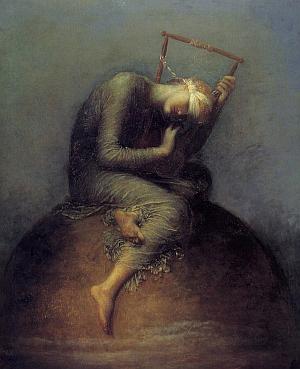
Hope
1886
George Frederic Watts
d. July 1, 1904
_______________________
Sabratha Fleeing
Ashur Etwebi
Translated from ArabicArabic by Khaled Mattawa
words without borders
Here you are now sitting in a cafe in Sabratha,
five openings in the iron fence,
five openings exactly.
You look at the right side of the Roman Theatre,
you drink your bitter coffee,
on the tip of your cup lie words and reminiscences.
(....)
The boy is marvelous as he should be.
He saw nothing except tiny longings,
like a nun's, sneak out to the street.
Maybe this tortured body will calm at last.
Maybe these imaginations will dive deep to where there is no censor.
Maybe these cities that fled will never return.
Maybe the morning will arrive without dark rings around its eyes.
(....)
Here you are now reading your fortune on an old stone.
The deviations of an old body surrender
to the low flow of the bass line.
The one o'clock chime comes to an end....(more)
|



 Janus Head
Janus Head

 The Age of Briggs & Stratton
The Age of Briggs & Stratton






































